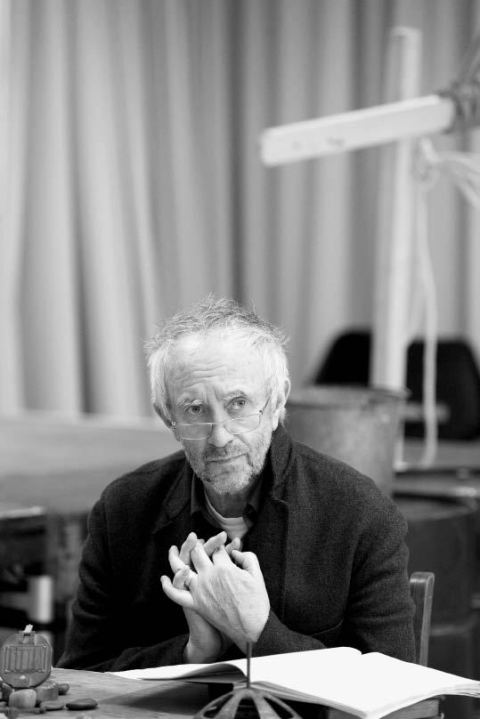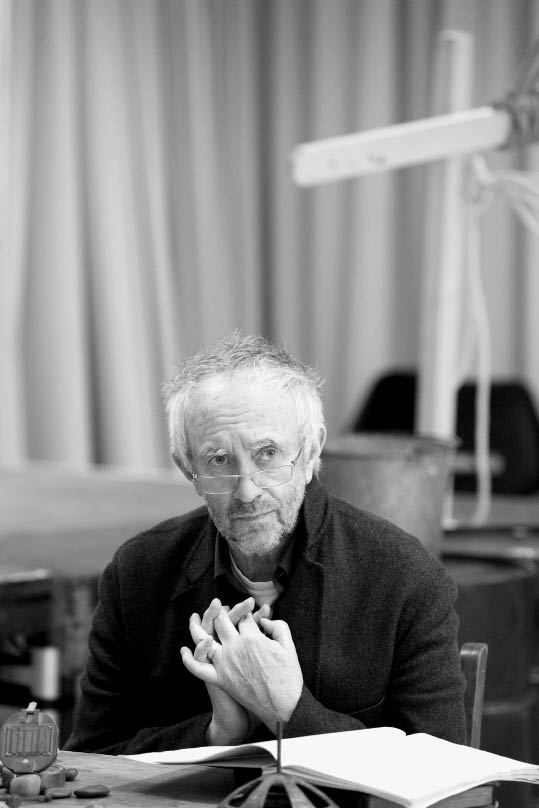Henrietta Bredin talks to Jonathan Pryce about the difficulties he found with Athol Fugard’s Dimetos
It is the end of a long day of rehearsal and Jonathan Pryce is sitting patiently at a scrubbed wooden table strewn with water glasses and roughly carved dishes, behind him a tangle of ropes and pulleys slung from an overhead beam. He’s two-and-a-half weeks into the business of putting together a performance of Dimetos, an infrequently performed play by Athol Fugard, written in 1975.
‘It’s almost like doing a new play really. Sometimes when a play hasn’t had any major revivals you think, well, there must be a reason for that. But I think the only reason for this not being done more often is its apparent difficulty. When I first read it I could feel how beautifully written it was, but after one reading I couldn’t tell what it was about. I went to talk to Douglas Hodge — he’s directing — and I said, “I love this but I have no idea what’s going on.” I think he was rather shocked, as he’s been living with it for a while and has a very clear line on it. At any rate, that’s the whole point of rehearsing — we’re clarifying and discovering and, hopefully, illuminating the piece as we go along.’
When someone is as courteous and questingly intelligent as Pryce it’s hard to tell quite how much he must dislike talking to a complete stranger about this intensely private and exploratory process. Looking faintly surprised he says, ‘I don’t normally talk about how difficult plays are to do but with this one it’s unavoidable. Maybe it’s because I’m right in the middle of that process at the moment, up to my neck in it. These rehearsals are pretty rigorous and intense — we keep trying out alternative ways of doing things, how to reach huge emotional pitches within a very short space of time. It’s quite exhausting. Good, though.’
How does he like to begin rehearsing a new role? Does he start with the whole thing memorised? Pryce starts laughing. ‘Good God, are you asking me if I’ve learned my lines yet? I did say to myself months ago that I should start learning it, especially the monologues towards the end, but for me it works better if I do that during rehearsals. Once you’re clear about your intentions and motivations within the structure of the play, then the lines will go in. It’s only when you’re not sure, when you don’t quite understand what you’re doing, that they fall away. And so much of it is about listening, hearing what other people say about your character. Young actors now, in the auditioning process, have to go through such an ordeal, reading for parts, being recalled over and over again. If they get the job they practically know the whole thing by heart before they start, and then they have to unlearn it again during rehearsal. I want us all to go through the process together, finding out about our own roles and the other characters as we go along.’
There are only four characters in the play; the other three are played by that most subtly tender and vulnerable of actresses Anne Reid, Alex Lanipekun (two years out of RADA) and Holliday Grainger (who has worked in television since she was a child but has never set foot on stage before). Experience and inexperience mixed up together, learning from each other. In addition, the lighting designer, Ben Ormerod, has actually directed the play himself, at the Gate back in 2003, and they’re working with an actor as director, Douglas Hodge. ‘It’s really great working with Dougie. He’s like the fifth cast member, and you don’t normally feel that with a director. We were sitting around this table about a week ago, reading through a scene. He was sitting next to me and I looked at him and thought, “Oh, who’s he playing?” He’s got an immense understanding of how each one of us approaches things.’
The character of Dimetos is a complex one, flawed and ambivalent. ‘He’s some sort of engineer or architect — you learn that he’s brought water to a city, that there was a housing project of some description — but there are no obvious contemporary parallels. It’s more like a set of characteristics that tell the story of Fugard himself, what he was going through politically and emotionally when he wrote the play. He’s published notebooks and diaries so you can look back and see what he was dealing with at the time. Dimetos is a man who’s escaping from a certain level of success and a set of responsibilities that comes with that, but he’s still drawn towards people and has an instinct for authority and command that he finds hard to abandon. And all of that is mirrored symbolically in the language, descriptions of mathematics and gravity, ropes and knots, that are metaphors for emotional pulls and ties. Although Fugard was a comparatively young man when he wrote this, it’s dealing with issues that confront you when you get to be around 60, things you deal with in everyday life. He’s written a character who’s done the same thing for a long time and has decided that he doesn’t want that any more; he’s run away from it. I’ve been in the theatre for 40 years and I can empathise with that.’ There’s quite a long pause, then Pryce says firmly, ‘I’m not saying that I feel like that. I can understand it but, no, I don’t feel like that at all.’
From the outside, Pryce’s career looks so fascinatingly varied and balanced that you wonder how much has been planned and how much is due to luck and circumstance. I tell him that I had seen a website on which the fact that he had been artistic director of the Liverpool Everyman was listed under the heading ‘Trivia’. He snorts appreciatively. ‘Well, it’s where I started, it’s the place I owe pretty much everything to, and it’s where, as it happens, I’m going back to at the end of the summer, to do The Caretaker. And I was a sort of caretaker as artistic director, keeping the job warm for Alan Dosser for a short time. I went there as an actor first, straight out of RADA, because they needed a high tenor for The Caucasian Chalk Circle and the composer, Tony Haynes, had been MD on the college production of Oklahoma! and heard me singing. I always said it was called the Everyman because it was every man for himself. I went from doing Elbow in Measure for Measure to Richard III and Edgar in King Lear, on the same set and on the same day as playing Owl in Winnie the Pooh, with Tony Sher as Christopher Robin, to an audience of completely baffled schoolkids. It was wonderful, rough theatre. We did a new play every six weeks and I made huge mistakes, but I was learning all the time. It shaped the way I am as a performer.’
The shape has shifted, dazzlingly, on stage and screen, to take on Hamlet and Fagin, Henry Higgins and Lytton Strachey, Sherlock Holmes and Governor Swann in The Pirates of the Caribbean. It will be worth watching what he becomes in Dimetos.
Dimetos is previewing at the Donmar Warehouse.







Comments